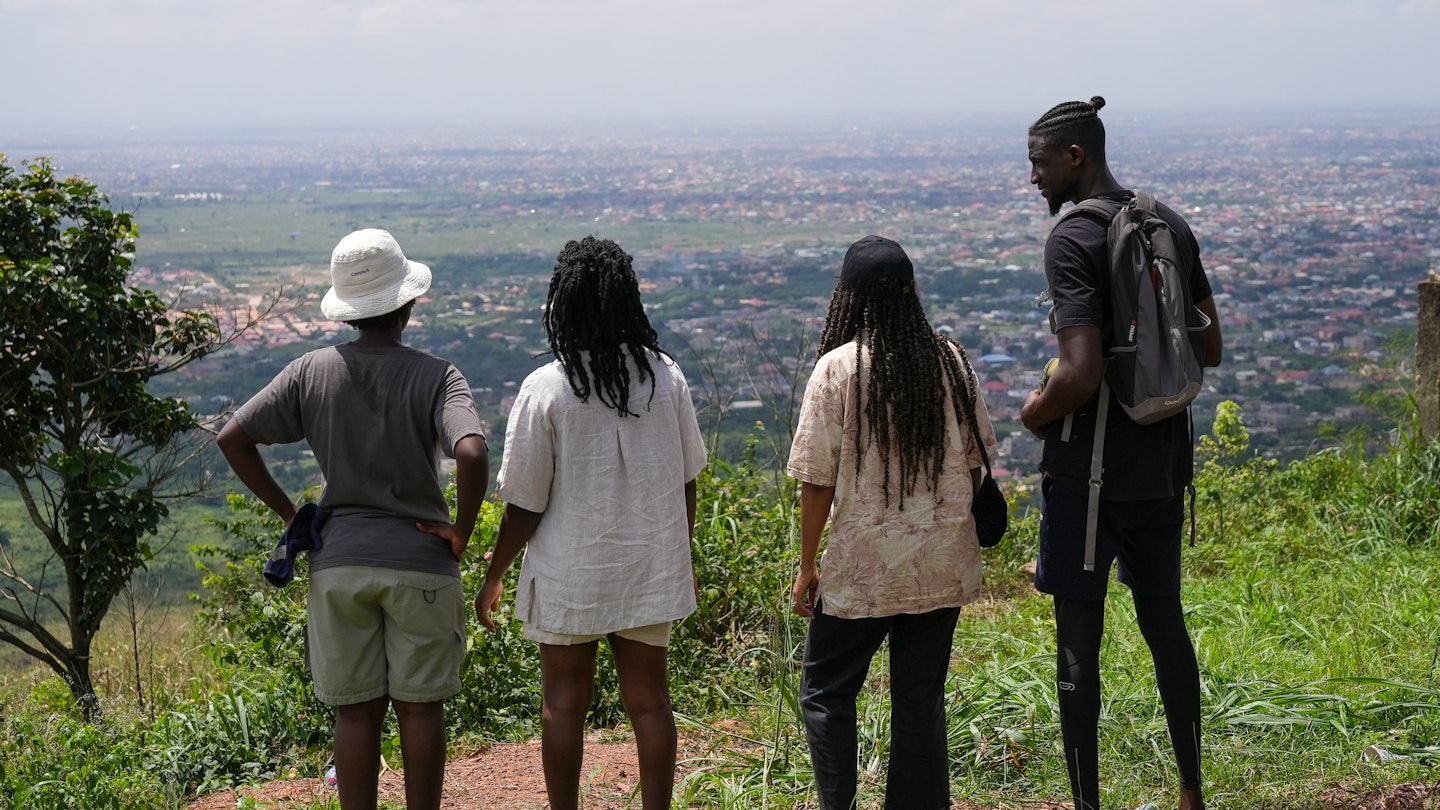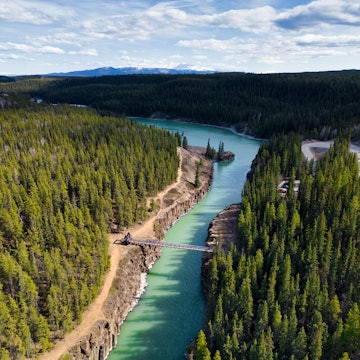

Getting around Ghana needn't be a headache with our insider tips © Lonely Planet
Ghana is famed for its beaches and coastal cities, but exploring the rest of the country is easy, whether you're drifting along the golden shoreline or heading inland to northern national parks.
Traveling through the country as a visitor can be challenging because there are so many unspoken rules, but with the right information, you’ll soon be on your way.
Whether you choose to hop around using a ride-share service or cover the miles on a long-distance bus, here’s what you need to know about getting around in Ghana.
Public buses are the backbone of travel in Ghana
The public buses run by Ghana's State Transport Corporation (STC) are a safe and affordable choice for short-haul and long-distance travel around the country, and they're comfortable even for longer journeys. The four-hour trip from Accra to Cape Coast costs about C85 one way, so getting from place to place won't take a huge bite out of your travel budget.
You can purchase tickets online for some trips, but most tickets are sold at the bus station – get there early before tickets sell out. Check the STC website to see which routes are running and which stations buses depart from (many cities have multiple bus stations, so make sure you head to the right one). Note that there's an extra charge for luggage.
Planes are a good option if your time is limited
Africa World Airlines (AWA) and Passion Air operate domestic flights within Ghana, with routes fanning out from Accra. Both airlines have several flights daily to Takoradi, Tamale and Kumasi, and Passion Air also offers flights to Wa, Ho and Sunyani. While flying costs more than going by bus, and there's also an environmental cost to consider, traveling by air is the fastest way to travel from region to region, and it’s usually a seamless process, with flights operated using small Embraer and Bombardier aircraft.

Traveling by car is an option for confident drivers
Driving in Ghana is not for the fainthearted, but you can rent a car and drive yourself as long as you have an international driver’s permit in addition to your home license. It's also possible to hire a car with a driver for US$100 to US$150 per day plus fuel. Road conditions in Ghana are not the best, so expect potholes, unfinished road surfaces, and lots of wandering livestock, wildlife and people on the backroads.
Local drivers routinely ignore everyday road rules, trucks and buses drive across multiple lanes, and traffic is heavily congested in most of Ghana's cities, so you may find renting a car is more stress than it’s worth. Note that most secondary roads are unsealed; make sure the insurance for any vehicle you hire includes cover for driving on dirt roads. The main international hire companies have offices in Accra.
Tro-tros are useful for cheap, fast journeys in Ghana
Tro-tros are small minivans or buses and are found in most cities in Ghana. They work like hop-on-hop-off public buses, stopping regularly along the way for passengers to board and disembark. These compact vehicles are often the cheapest way to get around in cities in Ghana, but rates vary depending on the route – a 30-minute ride will cost about C10.
Tro-tros are usually operated by a two-person team: a driver and a conductor, often referred to as the "mate." While the driver cruises along, the mate will yell out the name of the next stop or the final destination to would-be passengers by the roadside.
Using tro-tros as a visitor can be tricky as it's hard to tell where to get off if you don't already have some knowledge of the area, but it's easy to spot where minivans are pulling in to pick up passengers. To flag one down, just raise your arm with your index finger extended to indicate that you want to get on and tell the mate your desired destination so he can let you know when it’s time to get off.
Carry small bills on you – fares are low, and the mate may not have change for larger bills. Keep in mind that tro-tros stop constantly, which can add significantly to journey times. They are also usually packed and rarely have air conditioning. Collisions are quite common, and seatbelts are rare – it's usually best to avoid the seats up front next to the driver.

Taxis are an expensive option
Ordinary taxis are the most expensive way to get around in Ghana. They aren't metered, so you'll have to bargain for a fare, and drivers often charge higher prices for tourists. Tell the taxi driver where you want to go, they'll name their price, and you can either accept it or try to bargain for a lower fare.
Taxis are generally safe to use, but many people prefer to use Uber or Bolt because the app shows a map of the trip as it is happening, and you can share your location in real time with trusted contacts. It's a good habit to check the fare on Uber or Bolt as a point of reference for how much you should be paying for a regular cab. However, because taxi drivers set their own rates, the fare will always be higher than for a rideshare.
Rideshares are a handy option for downtown travel
Uber and Bolt are the most common apps used for hailing a rideshare in Ghana, and rideshares are usually cheaper than regular taxis, though fares can be pricey at peak times. These platforms are usually the most efficient way to get around, not least because they make it easy to find a cab for a fixed price.
Download both apps to compare prices and pick the operator offering the best fare for that particular journey because they often differ. Uber and Bolt drivers prefer cash, so be sure to carry enough cedi to pay for your ride. If you try to pay with a card via the app, you may notice that your ride keeps getting canceled as drivers seek out alternative customers who are willing to pay cash.
Uber is available in Accra and Kumasi, while Bolt is available in Accra, Kumasi, Takoradi and Cape Coast. As well as local trips, rideshares can be used for trips from city to city if the driver agrees to take you. If your desired destination is a city where Uber and Bolt are not operating, the driver may ask you to pay twice the official fare amount as they won't be able to get a passenger on the way back.

Walking is a good way to beat the traffic in town
Ghana’s cities often lack sidewalks, but it’s easy enough to get around on foot on the edge of the road, and this can be faster than sitting in traffic. However, be aware that you'll be sharing the roadside with crowds of people while dodging cars and speeding motorcyclists. So long as you are careful with the traffic, walking around town in the daytime is usually safe – avoid walking alone after dark.
Motorcycle taxis, or okadas, cut through traffic, but they can be dangerous
Motorcycle taxis known as okadas can be found throughout Ghana, and they are widely used by locals. In busy areas such as markets, you'll spot groups of local motorcyclists waiting around for business; tell the driver where you want to go, bargain for a fare, and you’ll be on your way. Because drivers are unlicensed, it's best to only use motorcycle drivers you know or drivers recommended by your hotel.
Note that okadas are not the safest option in Ghana – accidents are common, particularly in Accra and other large cities, so some visitors prefer to avoid them. It is possible to take an okada to another city, but it depends on how far the driver is willing to go. Up north in Tamale, driving conditions are less hectic, and okadas are safer. Observe the local driving culture to determine how comfortable you'll feel using these vehicles to get around.

Tuk-tuks are a cheap option in some Ghanaian cities
Tuk-tuks can be found in some Ghanaian cities, particularly Tamale, and these small, three-wheeled vehicles are a very efficient way to get around, with a fabric canopy supported by a metal frame offering some protection from the sun and traffic. People from northern Ghana call them “yellow yellows,” but they come in a variety of colors. It's easy to hail a ride – just catch the attention of a passing tuk-tuk driver by waving or raising a finger (with your right hand), and they will pull over to discuss a fare for your journey.
Accessible transportation in Ghana
Ghana is not the easiest place for travelers with disabilities. Sidewalks, where they exist at all, are uneven, and most buildings have steps, making life hard for those with mobility issues. It's often best to hire a car or van with the necessary modifications to accommodate your needs.
Uber and Bolt cars tend to be compact, but a folding wheelchair can be accommodated easily enough if you’re traveling with someone who can help you board. Tro-tros are not a practical option because there's limited space, and drivers only stop for a moment for people to board and disembark.
For more information on accessible travel, see Lonely Planet's free Accessible Travel Resources.
















